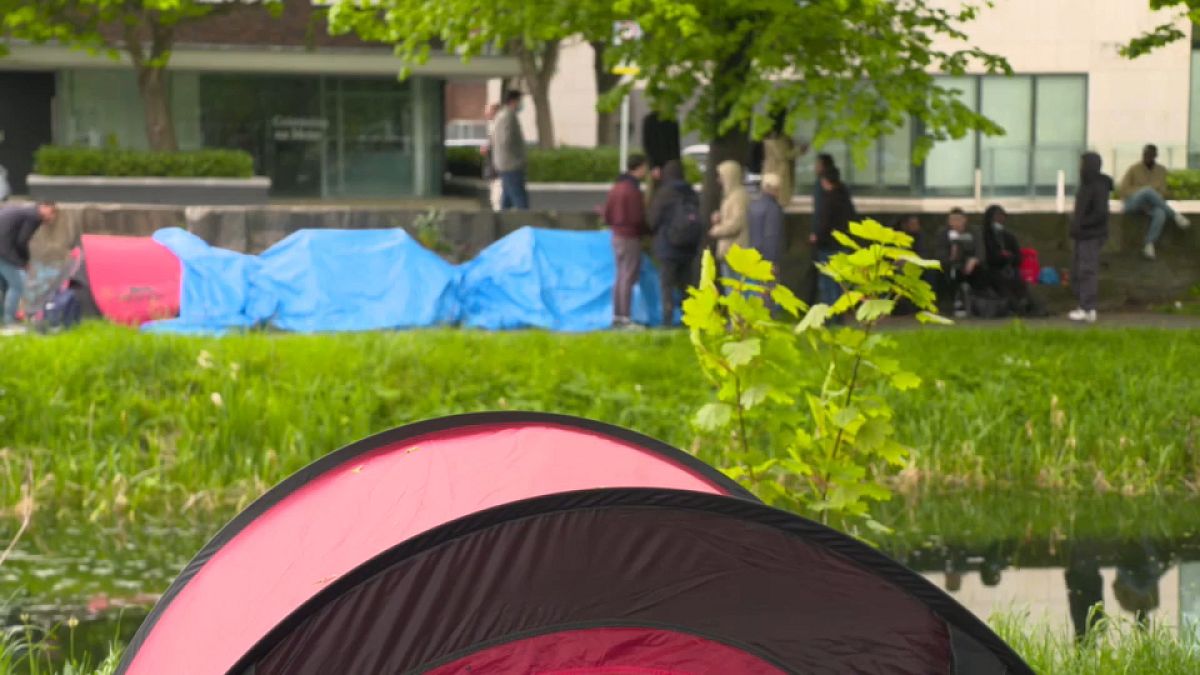London’s controversial plan to deport asylum seekers to Rwanda has caused a ripple effect that is being felt in neighboring Ireland. As a result of the UK’s proposal to send asylum seekers to Rwanda, some individuals have sought refuge in Ireland, crossing the border from Northern Ireland. This influx of asylum seekers has put a strain on the limited accommodation available in Dublin, leading to a makeshift camp near a canal. Despite the Irish government’s efforts to clear out the tents occupied by asylum seekers near the International Protection office, they have simply relocated a short distance away due to the scarcity of housing options.
One asylum seeker, Khyber from Afghanistan, shares his fears of being deported to Rwanda from the UK, prompting his decision to seek safety in Ireland. However, Irish authorities have informed him that there is currently no available accommodation in Dublin, leaving him and others living in tents without proper food or sanitation facilities. The uncertainty surrounding their situation has left them in limbo, waiting for accommodations that may not be provided for an indefinite period of time.
The Irish Government has indicated plans to amend legislation to allow for the return of illegal immigrants to the UK in the coming weeks. This legal change would give authorities the power to enforce deportation orders, but there are concerns about the practical implications. Member of the Irish Parliament and lawyer Michael McNamara highlights the challenges of the current situation, as the UK has stated that they will not accept returnees unless France also takes people back. As a result, the effectiveness of changing legislation may be limited if there is no reciprocal agreement in place between the countries involved.
The move by asylum seekers to Ireland reflects the growing concerns and uncertainties faced by those seeking international protection in the UK. The controversial proposal to deport individuals to Rwanda has understandably sparked fears and prompted desperate measures to find alternative safe havens. The lack of clear solutions and the challenges posed by legal and political complexities further complicate the situation for asylum seekers who are caught in limbo without adequate accommodations or support.
The impromptu camp near the canal in Dublin serves as a stark reminder of the struggles faced by asylum seekers who are left without proper shelter or resources. The makeshift living conditions highlight the urgent need for sustainable solutions and support for those seeking refuge in Ireland. The ongoing debate surrounding changes to legislation and the feasibility of implementing deportation orders underscores the complex nature of immigration policies and the human impact they have on vulnerable populations.
In conclusion, the plight of asylum seekers fleeing to Ireland in light of London’s plan to deport individuals to Rwanda sheds light on the challenges faced by those seeking refuge in an increasingly hostile environment. The lack of available accommodations and the uncertainty surrounding legal changes highlight the urgent need for comprehensive and compassionate responses to the plight of asylum seekers. As the debate continues, it is essential for governments to prioritize the well-being and safety of those seeking international protection, ensuring that their rights and dignity are upheld amidst the complexities of immigration policy and enforcement.










